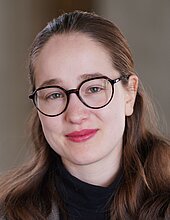Perschthaler, Marie-Elisabeth
Dissertation topic:
"Transformation as a task. A reconstruction of Corine Pelluchon's work for Protestant ethics."
Contact address at the University of Würzburg:
Institute of Protestant Theology and Religious Education
Wittelsbacherplatz 1
97074 Würzburg
First supervisor: Prof Dr Katharina Wörn
Second supervisors:
Prof. Dr Claus-Dieter Osthövener (Univ. Marburg)
Class in the Graduate School:"Environmental Humanities"
Doctorate in the Graduate School from SS 2024.
Abstract:
Human autonomy is a legacy of Enlightenment philosophy. Not only the freedom of thought, but also the independence of the individual itself from external constraints is a core idea that has become almost dogmatic within European-Western culture. However, it is also partly responsible for a present in which the individual has become isolated rather than emancipated, in which supposed freedom has turned out to be a lack of orientation. Socially, this is reflected in a culture of mistrust towards others, both between people and in our dealings with the non-human world. Climate catastrophe and the exploitation of animals are paradigmatic of this.
The French philosopher Corine Pelluchon is attempting to rethink the Enlightenment. In her early works and her books "Whereof we live - A philosophy of nutrition and the environment" and "Ethics of appreciation. Virtues for an uncertain world", Pelluchon outlines the project of a "philosophy of corporeality", which is based on the passivity and vulnerability of the subject and counters the Enlightenment's view of man with an alternative, determined by his relationality and receptivity. The obligation towards others replaces the radical idea of freedom. Accordingly, Pelluchon describes in "Das Zeitalter des Lebendigen. A New Philosophy of Enlightenment", Pelluchon describes the present as the "age of the living" in contrast to a past focussed on rationalism and the associated belief in progress. For them, the age of the living is both proof of the failure of a "scheme of domination" and a space for necessary transformation. Highly topical issues of climate change and democracy are reworked on the basis of an ethical "scheme of appreciation".
The dissertation with the working title "Transformation in Ethics in Corine Pelluchon" pursues two objectives: firstly, it aims to reconstruct Pelluchon's philosophical oeuvre as a whole. The philosophical and theological theories that form the background to the work will be identified in this context and analysed with regard to questions of contemporary (theological) German-language ethics. To date, no holistic presentation of Pelluchon's work has been undertaken in German; this work is intended as a contribution to filling this research gap.
The second aim of the work is to examine the connection between transformation - a central concept in Pelluchon's philosophy - and ethics in the face of current crises. The thesis aims to find out how Protestant ethics, which sees itself primarily as a methodical treatment of existing conflicts and discussion situations through processes of consideration, can benefit from Pelluchon's approach, which defines transformation as a task of ethical thinking.






